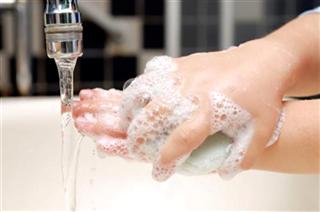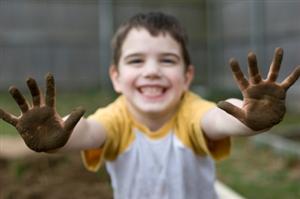Think Handwashing is Healthy?
Think Again
Since childhood, we’ve had it drilled into us just how important handwashing really is. We see it in health articles and on television; our mothers and doctors warn us to wash frequently. But is it really as necessary as everyone says? Are we really going to get sick if we don’t wash our hands? If you’re normally healthy and have no immune system health problems, the truth is that you might get sick MORE often and have more chronic illnesses by having careful
handwashing and personal hygiene practices.

But everyone knows that handwashing and being clean is healthy.
It’s true that improving hygiene practices have saved millions of lives in the past few generations. Treating drinking water, improved city sanitation, handwashing in hospitals, vaccinations and disinfection practices have prevented common diseases that killed off entire populations in the past.
But the United States has become a nation of clean freaks. We disinfect our homes, workplaces and gyms constantly never enjoy the Benefits of Sauerkraut that provide us good cut bacteria, and we have get Long Term Health Issues from Pasturizing Milk for fear of bacteria they don't understand they need.
It’s unthinkable for most people to go a day without a shower. We wash our hands constantly and are afraid to touch anything that anyone else has come into contact with. That MAY be the best way to protect communities, from communicable illness, but it may not be the best way to protect individuals from illness in the long run.
"The cleaner everyone is, the less
stimulation their
immune system gets.
Their immune system
tends to be incomplete."
- Nora Sarvetnick, Scripps Research Immunology Professor
The American Academy of Allergy, Asthma and Immunology, The American Journal of Respiratory and Critical Care Medicine, The New England Journal of Medicine, and others have highlighted the “Hygiene Hypothesis” of immune system health.
This theory suggests that exposure to bacteria, dirt, dust, animals and day care centers during childhood can contribute to lower incidences of asthma, allergies and autoimmune disorders.
Yes, LOWER!
The reason for this is because our Immune System depends on being active. Just like the army that we discussed on the Immune System Health page, challenging our bodies with pathogens and bacterial toxins can help to mature our immune systems and make them more efficient. This maturation allows us to differentiate friend from foe.
“…the immune system needs some kind
of hardening, some kind of resistance.
Put another way, you cannot really
build up good muscles
without doing exercise.”
-Subra Kugathasan, MD, Medical College of Wisconsin
Associate Professor of Pediatrics, Gastroenterology.
This lack of differentiation is the problem in asthma, allergies and autoimmune disorders. An immature or under stimulated immune system will put up a fight against common substances in the environment, attacking them as if they are a threat. In the case of autoimmune diseases, the immune system perceives our own bodies to be the threat! This becomes a real problem for those who suffer. Symptoms can range anywhere from sniffling and sneezing to full scale destruction of body systems.
What Does This Have To Do
With Handwashing?
Good handwashing IS important. For health care, day care and food service workers it is vital to prevent illness from being spread. In fact, “Poor personal hygiene in food handlers was identified as the second leading cause of illness in a review of food borne illness between 1983 and 1987” (Bean et al. 1990). Even in households, handwashing after using the bathroom and before and after handling food can prevent illness from several different pathogens. It just makes good common sense.
But common sense seems to have become “germ phobia”. People wash their hands constantly, refuse to touch door knobs, carry hand sanitizers with them wherever they go and disinfect every surface of their house weekly. One problem with this is that we are constantly exposing ourselves to Chlorine In Water and other environmental toxins present in hand soap each time we wash, not to mention the fact that we're destroying the good bacteria on our skin, and washing off the oils and acids that contribute to healthy skin.
Chlorine is in most household water systems, placed there by the water treatment plants to disinfect the water. It is absorbed by our skin in small amounts every time we wash. We also breathe it into our lungs when hot water aerosolizes, giving us a double whammy of Environmental Toxins every time we wash.
Antibacterial soaps are another concern. Americans use these antibacterial soaps, usually in the form of Triclosan, in just about everything. Aside from being ineffective at preventing colds and flu, Triclosan also has an irritating and drying effect on the Skin. Dry, irritated skin breaks down the defense system that the skin has against pathogens. Instead of getting rid of bad bacteria, the addition of antibacterials can kill good bacteria and allow the skin to harbor pathogenic bacteria.
One study showed that health care workers who performed handwashing with antibacterial soap had an INCREASED amount of Multiple Drug Resistant Organisms, called MRSA, on their hands.
"The marketing hype pushing total annihilation
of bacteria via wipes or sprays, coupled with the
dangerous reliance on antibiotics for almost any infection,
there is a real concern that we are misunderstanding
bacteria and the vital role some bacteria can
play in our overall health..."
-Professor Ken Jones, Immunologist,
Cardiff School of Health Sciences.

There are thousands of organisms in our environment and on our bodies. Our bodies are designed to have bacteria on them and inside of them all of the time. Certain Good Bacteria are such an integral part of our immune systems that we would die without them.
It is estimated that we have between 3 to 5 pounds of bacteria in our digestive system. These bacteria are not only important, but necessary for our survival. And eating foods that enhance these good bacteria, such as Sauerkraut, and Resistant Starch. Even our skin is coated constantly with bacteria no matter how hard we try (wrongly) to get them off.
“42% of people believe society's
health would improve if all bacteria were eradicated.”
-ICM Research Study
Most people don’t realize that destroying bacteria by handwashing and frequent showering only makes way for more bacteria to live where the others have died. This paves the way for illness and infection. Regular soap, even without the drying effects of antibacterials, have been shown to cause a reduction in the thickness of the outer layer of the epidermis by 40% as well as causing a breakdown in the lipid layer of the skin. This effect is a probable factor in the large rise of Eczema in past years, according to researchers at the University of Sheffield Medical School.
So what do you do?
Rosalind Stanwell-Smith and Sally Bloomfield coauthored “The Hygiene Hypothesis and Implications for Home Hygiene”, This extremely comprehensive report on all studies done that relate to the hygiene hypothesis states,
“We can be clean, hygienic and healthy without attempting to create a sterile environment in our homes or a sterile ‘cocoon’ around our infants. Our modern lifestyle has left us confused about the nature of real threats in our environment and has also raised awareness of the possibility that over-zealous hygiene activities are out of tune with nature.”
Well, it’s obvious that handwashing and otherwise having good hygiene is important to prevent the transmission of disease, but it’s also important that we have regular exposure to all kinds of microorganisms in order to keep the immune system at its best and to keep our gut and skin coated with good bacteria.
‘Targeting’ our washing and cleaning in a conscious manner may be the answer, according to Stanwell-Smith and Bloomfield. The report explains targeting as a way that we can wash when we do ‘high risk’ activities such as using the bathroom, changing a diaper or cutting meat – to name only a few. We can disinfect surfaces where these high risk activities occur. And we can avoid unnecessary cleaning that exposes us to harsh chemicals, kills beneficial bacteria and dries out our skin.
Researchers and doctors are not ready to tell parents to let their kids eat dirt in order to get their immune systems strong, yet! But hopefully we can learn to achieve a balance between preventing disease on one hand (pun intended!) and keeping our immune systems strong on the other.





